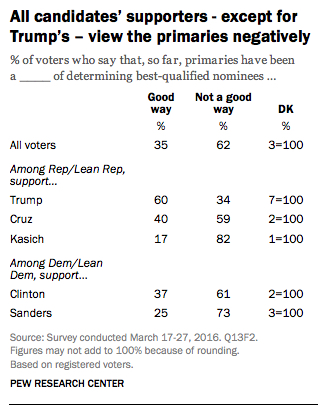You’d think that Republican voters would want to crumple the primary system into wastepaper and chuck it atop a radioactive dump. On the one hand, Donald Trump has criticized the process (“unfair“), the rules (“unfair“) and the size of the field (“unfair“), and his supporters have consistently adopted his perspective on the campaign. On the other hand, the #NeverTrump movement is disgusted with @realDonaldTrump, and the candidates running to stop him have blasted the media for providing him so much free coverage. There are grievances on all sides.
And yet it’s Democrats who dislike the primary the most.
According to a new Pew Research poll, only 30 percent of Democratic or Democratic-leaning voters say that the process has been a good way of determining “the best-qualified nominees.” That number is 22 points off the 2008 mark, the last time Hillary Clinton was on the ballot.
The share of Republican and Republican-leaning voters with a positive view of the primary is 42 percent, which is comparable to previous levels in 2008 and 2000.
But when breaking down the figures among supporters of each candidate, only Trump backers have a favorable opinion of the process.

The easiest explanation is that their man is winning. But he’s not winning in a walk. Cruz and the anti-Trump coalition remains formidable in the delegate count, next Tuesday’s Wisconsin vote looks good for the Texas senator, and there’s evidence that Trump is beginning to slip below the delegate targets he needs to meet in order to capture a majority before the Republican convention. Trump voters might think he’s “the best-qualified nominee” for the GOP — but he is by no means certain to be the nominee.
In the Democrats’ case, both Hillary supporters and Bernie supporters have overwhelmingly negative opinions of the primary. That’s easy to imagine from the perspective of a Sanders supporter: Not only is Clinton winning, but she’s doing so with the help of superdelegate kingmakers that empower the party elite. Even with that obstacle, Sanders has made a prolonged and substantial challenge that is destined to last all the way to Philadelphia. Many of his supporters are true believers and intractably anti-establishment — the same establishment that’s behind Clinton.
Yet even a majority of her voters have taken a position against the process. Why? Pew’s report doesn’t specify or speculate. But here are a few things to consider:
One, all voters asked this question by Pew in previous elections have been skeptical of the primary. Since 1992, no more than 43 percent of those polled (2008) have said the process was a good way to select the best-qualified nominees. In four elections since that time — 1992, 1996, 2012 and this year — that number was 35 percent or below. Generally speaking, voters don’t like the primary.
Two, Clinton lost a bitterly contested race the last time she ran. Anyone who was with her and not Obama then may not have fond memories of the process and rosy attitudes toward it now.
Three, Pew’s question doesn’t ask about “your party’s nominee,” but the “best-qualified nominees.” So the responses of Clinton’s backers don’t necessarily reflect their opinions of the primary as it relates to her.
That said, watch what happens if Sanders somehow upends her candidacy.
